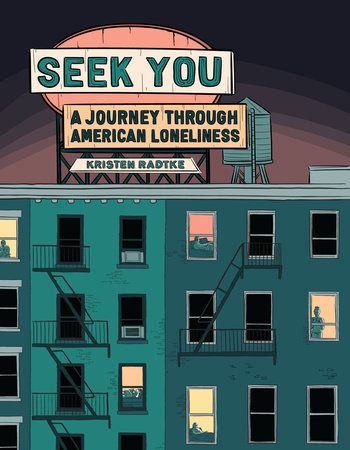[ad_1]
Though the COVID-19 pandemic has understandably dominated most of the conversation around public health in the last year and a half, it has been running alongside—and intertwining with—another crisis: the “loneliness epidemic.” For years leading up to 2020, experts have been warning us about the effects that modern-day loneliness can have on our minds and bodies.
When Kristen Radtke set out to write Seek You: A Journey Through American Loneliness in 2016, this is the world she was living in. At that time, social distancing wasn’t a shield against contracting a potentially deadly virus: it was a problem we needed to wage a war against. And it still is, maybe now more than ever.
Since Radtke wrote Seek You, a graphic nonfiction book detailing many aspects of the loneliness epidemic, in a pre-pandemic world, some aspects already feel a little dated. But if she were to include the effects of recent social distancing and isolation requirements, it would be an entirely different book, one that she indeed hadn’t intended to write.
Rather, Seek You takes readers on a much larger trip through loneliness, making a claim that it is not inherently specific to any one era, but instead suggests the idea that humans are always prone to it to some degree. Depicting Radtke’s personal experience with solitude, scientific research about how loneliness can wreak physical havoc on our bodies and the cultural conditions that have set Americans up to especially feel this pain, the book reaches very wide in its scope.
In many ways, it meets the mark, serving as an entertaining and informative encyclopedia of seclusion. But the book’s thesis is scattered, and Radtke’s thoughts can appear to tumble over themselves, leaving readers to flip back and forth between pages, wondering what thread they might have missed.
While this book is a very well-researched piece of nonfiction, Radtke’s writing does veer into the poetic, especially when she describes her own experiences with loneliness.
“Loneliness feels to me like being underwater, fumbling against a muted world in which the sound of your own body is loud against the quiet of everything else. The simple gestures you enacted so easily on the ground become laborious, pushing against a weight no body is built to move through,” she writes, and the accompanying illustration of a woman sinking to the bottom of the ocean drives this message home.
The book is aesthetically stunning too. Radtke’s illustrations are expressive and the kinds of images she chooses to accompany her text vary from a direct storyboard of a scene she is outlining to more abstract depictions of loneliness: a man floating alone in the isolating infinity of space; a woman sinking to the bottom of the ocean.
Despite the many sections of this book that are lovely to look at, containing much thought-provoking and readable prose, the book remains a non-intuitive read. I think this is where the otherwise deftly-deployed comic format fails: if you are required to scrimp on words when connecting such far-reaching thoughts and research, it’s easy for your narrative to come across as scattered.
The book begins with an explanation of its title, which comes from ham radio lingo that Radtke’s father was obsessed with as a kid: a “CQ Call” (or “Seek You”) is, as Radtke puts it, a “reaching outward, an attempt to make a connection across a wavelength with someone you’ve never met.” This is very touching, especially paired with the story of Radtke and her father, who evidently had a relationship which lacked the closeness she desired, perhaps echoing some larger societal problem with emotionally distant fathers.
But immediately, instead of elaborating on her relationship with her father or the factors which contributed to it, Radtke jumps into something new, with a too-brief history lesson about the creation of suburbia and then the birth of the television laugh track. From here, we weave in and out of Radtke’s own life and her research on loneliness not only as an American phenomenon, but as a larger, universal concept itself. It feels dizzying to go back and forth between microbiological details of how loneliness can physically alter our brain chemistry and intimate stories of Radtke’s friends’ loneliest moments in only a few pages, and neither narrative gets a fair shot at more development.
One of the most gripping sections of the book is about the American cowboy myth and how deeply the idea of masculine individuality has permeated in American culture. Radtke uses the comic form to good effect here, illustrating familiar “Wild West” iconography to form a cohesive and compelling cultural criticism. Radtke has lived in Las Vegas, and her experience there, grappling with the relationship between lavish consumerism, cowboys and loneliness, could make a book of its own.
But when the story veers off again—to analyze the potential impact this toxic, rugged individualism has had on mass shootings in the United States—it loses its way. Even after all of this rich analysis, Radtke does not reach a sensical conclusion about her thoughts on gun violence and its place in our culture. This is completely understandable—it’s a big issue!—but it becomes a bit tiring to read such meandering thoughts, even if they are written beautifully and accompanied by engaging illustrations.
In the last section of the book, Radtke heavily focuses on the work of Harry Harlow, a psychologist best-known for studying the importance of physical touch and parental love by setting up experiments with Rhesus monkeys. This is the part of Seek You that works the best. Radtke’s emotive art adds a real depth to the explanation of Harlow’s experiments: seeing the pain on these eerily human-like monkey’s faces as they’re being tortured through isolation drives the point home. We—humans and monkeys alike—need each other. That seems to be the point Seek You is trying to make: we need each other. It’s a simple thesis that has served as the basis for gorgeous and important art and literature for time immemorial, but it is complicated in this piece of graphic nonfiction that tries to be too many things.


NONFICTION
Seek You: A Journey Through American Loneliness
By Kristen Radtke
Pantheon Books
Published July 13, 2021
[ad_2]
Source link
